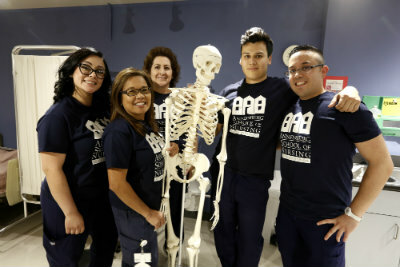ASN Vocational Nurse Program: A Prescription for Success


ASN Vocational Nurse Program: A Prescription for Success
The Jewish Home’s Annenberg School of Nursing (ASN) began its vocational nurse program in 2007. The 12-month, full-time program includes classroom and skills lab instruction as well as clinical training at local hospitals and other sites. A vocational nurse, or VN, is trained to administer medication, change dressings, monitor vital sign, and maintain patient charts. The program prepares students for the NCLEX-PN® licensing examination.
ASN is currently accepting applications for the Class of 2017, scheduled to begin in September. Information is available online at www.asn.edu or by attending an Open House event, which will be held on July 19th and August 2nd.
While someone considering a career as a vocational nurse has many schools to choose from, there are some very good reasons to choose ASN. First of all, it’s a program of the non-profit Los Angeles Jewish Home, an organization that has provided excellence in senior healthcare since 1912. The relationship between the Home and ASN is a major reason many students choose ASN for VN, nurse assistant (CNA) and home health aide (HHA) studies.
According to the VN Class of 2016, additional reasons to choose ASN are:
facilities • accreditation • financial aid package • low tuition
faculty • NCLEX-PN® pass rate • employment resource
excellent clinical sites • graduation rates • small class size

Alumni of ASN’s VN program agree. “The small class size provided a fantastic experience for me, and faculty and staff were always available to help with anything we needed,” says Joselyn Shmaeff, BSN, MBA, RN. After licensure, the Class of 2011 graduate went on to work as a LVN in skilled nursing at the Home, in pediatric home health and outpatient wound care, and to teach VN students. She completed her Bachelor’s in Nursing and attained her RN license in November 2015. Joselyn now works full-time as a RN in the ICU of Valley Presbyterian Hospital. “I owe the Annenberg School of Nursing everything! They provided me with an excellent foundation in nursing and a great starting point to a career with endless possibilities.”
Class of 2009 graduate Norma DelCid, BSN, RN, also speaks highly of her experience at ASN. “I could not have chosen a better school to start my life – and I say life because nursing is my life.” Now director of health services at the Home’s Fountainview at Eisenberg Village, Norma explains, “The instructors prepared me for the real world of nursing. I am now a BSN, RN, and I still refer back to what I learned at ASN, whether it be documentation, assessment, or bedside manner. The faculty and staff encouraged me to believe in myself and molded me into the nurse I am today.”
ASN director Marie Cordeiro has some thoughts about the Annenberg experience and how it can lead to a successful career in nursing. “Our curriculum is comprehensive – we cover the full journey of life, from birth to death. We offer excellent resources, such as our skills and computer labs.” The skills lab features medical manikins that provide a way for students to practice inserting gastric tubes for feeding, giving injections, and wound care. A special maternity manikin, Coco, allows students to practice delivering babies and providing post-delivery care.
“We’ve also added two clinical sites to our rotation,” adds Marie. “Kaiser Permanente, a medical-surgical hospital, currently provides our students with hands-on experience in their maternal/child clinics. ASN has been approved to utilize all Kaiser clinics as clinical sites in the future. Our students will be rotating through Pacifica Hospital, where they will care for patients in the sub-acute unit. These patients may be on ventilators, have tracheotomies, or have gastric feeding tubes.” At Mission Community Hospital, ASN students work in the out-patient surgery department, where they see a wide variety of procedures, and in ICU. “Our students are exposed to all components of nursing, and have the ability to begin a career in any area of nursing.”
Nursing continues to be a fast-growing field. The Bureau of Labor Statistics states that nursing, and particularly vocational nursing, will grow by 25% by the year 2022. According to Marie, “This is significant. As our baby boomers age, the “oldest of the old” will become the largest segment of our population. They will also be the biggest consumers of healthcare. There are not enough RN schools to fill all the spots that will be needed. And, home health care will continue to grow, which is a natural fit for a VN.”
The field of nursing is one that offers challenges and provides great rewards. If you are considering nursing as a career, consider the Annenberg School of Nursing. For more information, please register to attend an Open House by calling Cindy Thomas at (818) 757-4431 or visiting the ASN website at www.asn.edu.